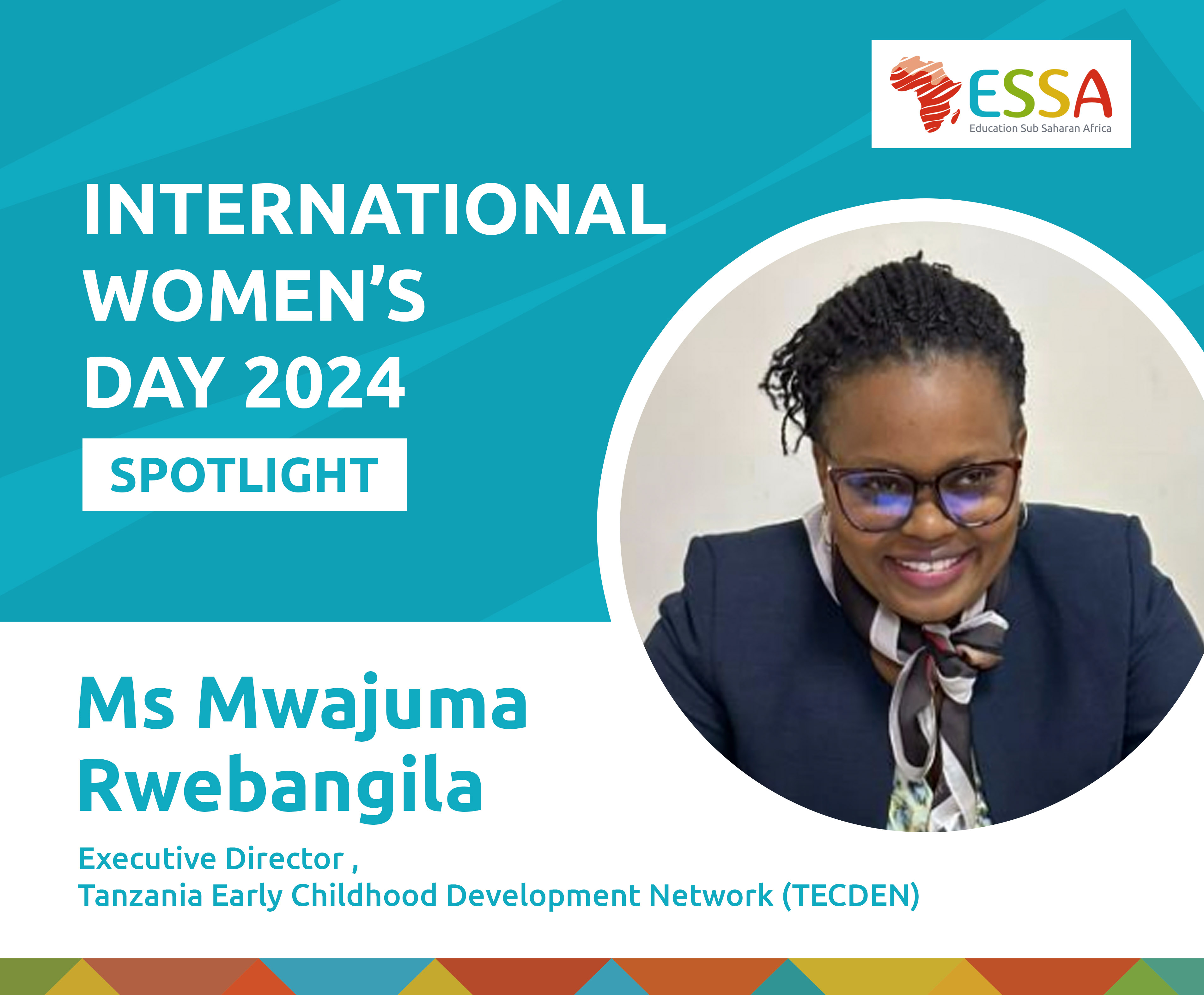International Women’s Day Spotlight: Ms Mwajuma Rwebangila
Spotlight on Ms Mwajuma Rwebangila, the Executive Director for the Tanzania Early Childhood Development Network (TECDEN)

For this year’s International Women’s Day, ESSA is spotlighting three female African researchers working in Early Childhood Development (ECD) and Foundational Learning (FL).
With the theme for this year being ‘Inspire Inclusion,’ our goal is to spotlight these wonderful women and their impactful work, inspiring and encouraging other female African researchers, especially those who are beginning their careers in education research.
This marks the first part of our four-part blog series.
Could you tell us a bit about yourself?
My name is Mwajuma Kibwana. Rwebangila came after I got married. So yes, Rwebangila is a family name, but my father's name is Kibwana. Therefore, I am known as Mwajuma Kibwana. I am the second to last child in my family, the youngest of four girls.
I was raised in a village where I had ample opportunities to play with nature and my friends. The environment was safe, and I consider my childhood to have been very conducive compared to the present time when I am raising my own children.
I had the opportunity to attend primary school, just like my elder brothers and sisters. I went to the local government school in the village, which was conveniently located near our home. Additionally, I was fortunate enough to attend preschool, where we sang, drank porridge, and then returned home. That was the extent of my early schooling experience.
As a child, I did not receive much support for learning from either my mother or my father. Instead, I relied solely on my teachers at school. However, I learned a great deal from my environment.
I dedicated myself to education because I wanted to achieve something and uplift my family. Despite my father being a magistrate, no one in my family had attended university before. Therefore, I became the first to pursue higher education, and I succeeded.
How did your relationship with education research start?
During my master's degree, I focused on early childhood research, initially unfamiliar with the field. Inspired by cultural factors, I centered my project on the impact of cultural influences on exclusive breastfeeding. This exploration sparked my interest in ECD as I recognised the crucial role of exclusive breastfeeding in childhood development. Upon completing my degree, I secured employment at an ECD organisation, further nurturing my passion.
My interest lies in mental health, as I perceive a correlation between parenting and mental well-being. Effective parenting hinges on one's mental stability, particularly vital for women, the primary caregivers in African households.
What are your aspirations right now?
Working in ECD presents numerous research opportunities. As a network leader, I collaborate with various research institutions to enhance the network's operations. This involves working closely with the Ifakara Health Institute, Oxford Policy Management, and occasionally seeking their assistance, particularly in strengthening monitoring, evaluation, and learning for the network. Effective advocacy for ECD initiatives requires evidence generated from the field. Thus, I recognise the immense potential in engaging with research institutions to produce valuable evidence that bolsters our work and elevates the network's standing.
The evidence generated instills confidence in our endeavours and enables stakeholders to propose programme realignments and advocate for effective ECD models. Moreover, I see the importance of connecting university students with research institutions. Collaborating with higher learning students offers a cost-effective means of conducting research. By providing support to these students, research institutions can assign topics for study, yielding results at a minimal cost compared to standalone research projects.
Additionally, bypassing ethical clearance protocols streamlines the research process. Exploring university libraries for dissertations on education provides further research avenues. Rather than solely fulfilling academic requirements, these dissertations can serve as catalysts for societal change, fostering programmes that support communities.
Is there any woman in education research in Africa whom you greatly admire and would like to meet?
There are inspiring figures in the field of research, with Dr Julie Makani in Tanzania being one example, renowned for her work on sickle cell diseases. These individuals are known for conducting groundbreaking research and using it to positively impact their communities.
On this International Women's Day, it's crucial to consider how we can inspire inclusion for female African researchers just starting their careers. According to the UNICEF Institute of Statistics, only 30% of African researchers are women, a statistic that warrants attention.
Female researchers should use their work to raise awareness and effect change within their communities and beyond. Encouraging young female researchers to enter the field will increase representation and empower them to make decisions based on their research. Additionally, support is essential for publication in reputable journals and further research opportunities.
As a network leader, I actively facilitate connections for female researchers to penetrate the research market and maximise their potential. It's vital to recognise the capabilities of women and foster partnerships with supportive mentors and allies.
In conclusion, let's prioritse the advancement of young female researchers, providing them with opportunities to engage with established figures in their field and be inspired by their achievements.
Mwajuma Davina Rwebangila, M.A. in Development Studies, has served as the Executive Director of the Tanzania Early Childhood Development Network (TECDEN) since January 2021. Over the past 18 years, she has contributed to various programmes, including HIV/AIDS, youth and women empowerment, accountability, and early childhood development.
In her current role, Mwajuma provides strategic leadership and technical guidance to ensure TECDEN's programmes align with the network's objectives. She fosters strategic linkages and partnerships within and outside the African region. Over the past three years, Mwajuma has led TECDEN’s coordination of ECD non-state actors, collaborating with the Tanzanian government to promote the ECD agenda. This includes the development, launch, and implementation of the National Multi-sectoral ECD Program (NMECDP) at both national and sub-national levels. Additionally, she serves as the Global Leader for Young Children under the mentorship of the World Forum Foundation.
She is fluent in both Swahili and English.